'I won't give up my nationality': Why foreigners choose not to become Austrian
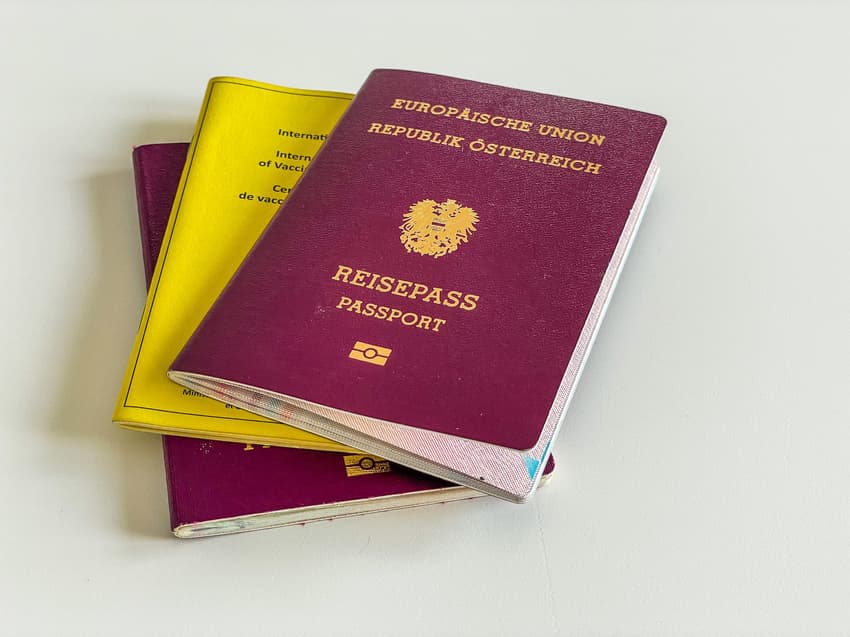
Austria has a high proportion of foreigners, many of whom are eligible to get Austrian citizenship - but ultimately choose not to. We spoke with them to understand why.
Austrian citizens living in Austria certainly have some rights and privileges not extended to foreign nationals living in the country - especially if the foreign national is not an EU/EEA citizen.
Perhaps the main right that no foreigner has in Austria is the right to vote in federal and provincial elections. As a result, even those living in Austria and paying their taxes here for decades do not have a voice when electing most of the officials (EU citizens can vote in local elections, including for their district representatives in Vienna).
READ ALSO: Who is entitled to Austrian citizenship by descent and how to apply for it?
Another major right reserved only for Austrian citizens is the right to apply for certain jobs, not only political careers but also public positions, such as the police force. In addition, Austrian and EEA/EU citizens are also entitled to immediate access to public services and offers, such as subsidy housing and the job market, without the need to apply for a specific permit.
Despite the benefits, few people entitled to Austrian citizenship through naturalisation choose to apply for it. In fact, a 2020 EU survey showed that Austria's naturalisation rate of foreign citizens was among the lowest in the European Union, at 0.6 percent. Only the Czech Republic (0.5 percent), Latvia (0.4 percent), Estonia (0.4 percent) and Lithuania (0.2 percent) had lower rates.
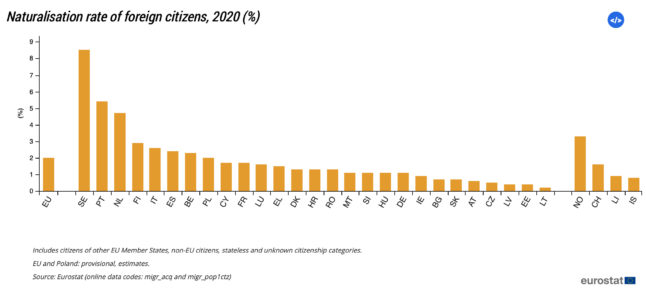
Why do people choose not to naturalise Austrian?
Many of the foreigners living in Austria are already entitled to apply for citizenship. Among the requirements, the person must have legal residence in the country for at least 10 years unless they fit into some exemptions, such as being an EU citizen or being married to an Austria, in which case they can apply for Austrian citizenship after six years. However, among all the strict requirements, one stands out as the main thing that puts people off: having to renounce their original citizenship.
"I think I speak for many people when I say that I’d claim my Austrian citizen at the drop of a hat if I could also keep my citizenship of birth (the UK in my case)", Graham Crewe, who lives in Salzburg, told The Local.
More than 70 percent of the people eligible to become Austrian but who choose not to mention the fact that they would have to give up their other citizenship as a reason why. Other answers included "I don't need it - can live and work in Austria without it" (14 percent), and "too difficult or expensive" (six percent).
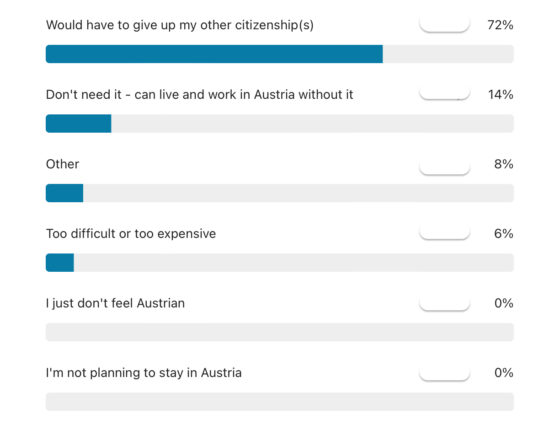 For many readers, as much as they feel more at home in Austria, as mentioned by Reginald V. Webb, or as much as they love Austria, as Crewe said, they'd still be reluctant to give up their birth citizenship.
For many readers, as much as they feel more at home in Austria, as mentioned by Reginald V. Webb, or as much as they love Austria, as Crewe said, they'd still be reluctant to give up their birth citizenship.
Ozzy, who lives in Upper Austria, said: "Whilst I have no intention to return to the UK and, in fact, have only been back once in 15 years, I would still feel uncomfortable giving up my British citizenship".
Cassandra Van Gelder, who is currently in Vienna, also would never give up her original citizenship: "The requirement to give up my national identity in a country that merely tolerates darker skinned people is a big ask.
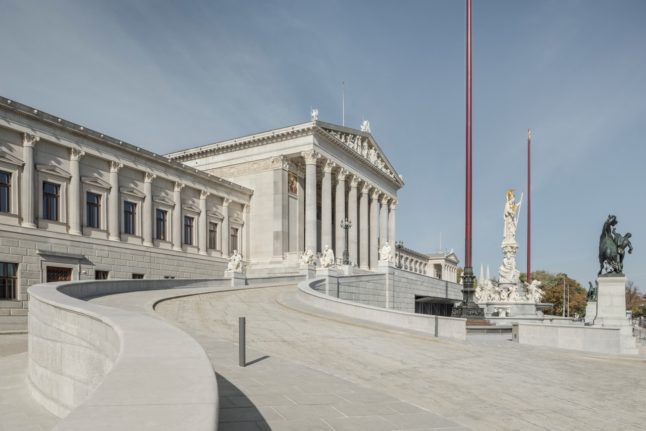
Renovated facade. View over the ramp to the portico (Schmerlingplatz side) (Copyright: Austrian Parliament)
"In my country, I am not only native-born but part of the first people who inhabited it. I feel honoured to have that as part of who I am. Asking me to nonchalantly give that up is too much."
READ ALSO: Could Austria change the rules around citizenship?
Many foreigners, even if living for decades in Austria, still have strong ties to their home country and wouldn't want to give up their passports. "I don’t wish to lose my connection with my birth country and family there, especially my teenage children who live with my ex-wife", said Joe Clayton.
A 49-year-old US citizen, who has lived in Vienna for the past 11 years, also said: My extended family lives in the US; therefore, I would be unwilling to renounce my citizenship. I would gladly consider dual citizenship.".
In some cases, a significant concern about losing their birth citizenship is that Austria may not be the country they want to live in forever. Maria, 36 years old, said: If it were possible to have double citizenship, I would apply. It's not possible, and I don't want to lose my Finnish citizenship because maybe in future, I will move back to Finland."
READ ALSO: How foreigners can get fast-track citizenship in Austria
Patricia Mallory, a British citizen, mentioned that having a home in her native UK was a significant factor in her decision not to give up on her British nationality. "I don't wish to be subject to any ruling the British government may bring in on the length of stay for foreigners in the UK - I don't trust those xenophobes."
She added: "I do not see why I may not have a dual citizenship in Austria - and I do not feel sufficiently Austrian to be merely Austrian."
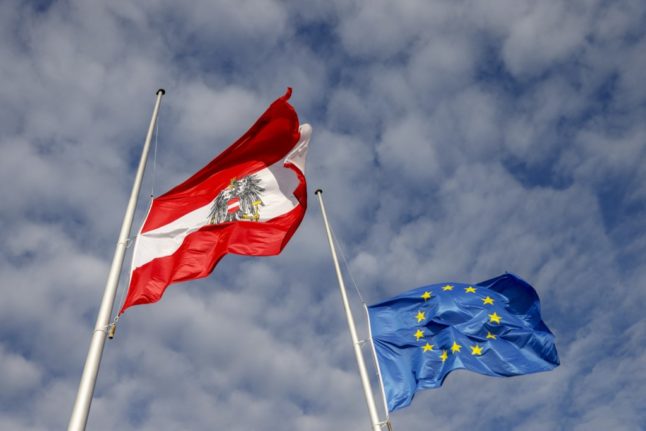
An Austrian and a European flag flutter in the wind. (Photo by Odd ANDERSEN / AFP)
'I'm a taxpayer'
Many people resented that they won't be allowed to participate in political decisions in their current homes without giving up their nationality.
"As a tax-paying full-time worker in Vienna, I would like the option/ability to vote on local Vienna issues about how my tax dollar is spent or receive a reduction in taxes or another type of compensation", said a Viennese American citizen.
Another reader agreed: "I shouldn't have to give up my other citizenship to have natural rights in the country I live in and support through taxes and being a member of society."
For many, the strict requirements do the opposite of helping with integration. For example, a US anonymous reader said: "Their archaic citizenship rules make me want to integrate even less because I’d have to give up something too important to me to be one of them!"
READ ALSO: IN NUMBERS: The Vienna districts where most foreigners live
Joanna Eggenweber, who has lived in Austria for 26 years, would only naturalise if she were allowed to keep her US citizenship - even though she is already integrated. "I am fully integrated into the local culture (not expat life) and speak German fluently. I also probably know the culture and history better than most Austrians."
Most readers said they'd consider becoming Austrian if the country allowed for dual citizenship and Petar, from North Macedonia, stated: "I don’t see the actual reason why someone should forget their heritage and cancel their other citizenships just to get an Austrian one.
"The Germans are planning to abolish this dumb rule! Come on, Austria you can do it too!".
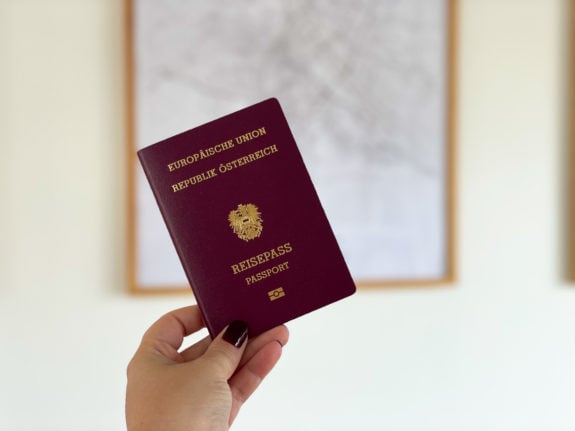
Austrian passport. (© The Local)
Other reasons not to become Austrian
Even if the dual citizenship rule was the main reason foreigners wouldn't naturalise Austrians, other motives were also cited.
"The Austrians make the process unduly difficult", said Mallory, who lives in Linz. Victoria Schekolin agrees: "There are too many rules. It's a complicated and expensive process", she stated.
READ ALSO: Everything you need to know about retiring in Austria
"If I do it now, I have to go to serve either military or social service", said Shan, from Pakistan, referencing Austria's conscription rules for male citizens. But, he joked: "I am waiting to turn 35... after being 35, Austria doesn't consider man as strong enough. Thus no service required".
Kiran Griffiths, from India, is also waiting to pass the age of conscription: "I'd have to do military service or Zivildienst. This means I will be paid just a fraction of what I make now for the period. So I'll have to dig into my savings to cover my many financial responsibilities, including a student loan in my home country".
READ ALSO: Why has naturalisation in Austria doubled in 2022 - and who are the new citizens?
Comments
See Also
Austrian citizens living in Austria certainly have some rights and privileges not extended to foreign nationals living in the country - especially if the foreign national is not an EU/EEA citizen.
Perhaps the main right that no foreigner has in Austria is the right to vote in federal and provincial elections. As a result, even those living in Austria and paying their taxes here for decades do not have a voice when electing most of the officials (EU citizens can vote in local elections, including for their district representatives in Vienna).
READ ALSO: Who is entitled to Austrian citizenship by descent and how to apply for it?
Another major right reserved only for Austrian citizens is the right to apply for certain jobs, not only political careers but also public positions, such as the police force. In addition, Austrian and EEA/EU citizens are also entitled to immediate access to public services and offers, such as subsidy housing and the job market, without the need to apply for a specific permit.
Despite the benefits, few people entitled to Austrian citizenship through naturalisation choose to apply for it. In fact, a 2020 EU survey showed that Austria's naturalisation rate of foreign citizens was among the lowest in the European Union, at 0.6 percent. Only the Czech Republic (0.5 percent), Latvia (0.4 percent), Estonia (0.4 percent) and Lithuania (0.2 percent) had lower rates.

Why do people choose not to naturalise Austrian?
Many of the foreigners living in Austria are already entitled to apply for citizenship. Among the requirements, the person must have legal residence in the country for at least 10 years unless they fit into some exemptions, such as being an EU citizen or being married to an Austria, in which case they can apply for Austrian citizenship after six years. However, among all the strict requirements, one stands out as the main thing that puts people off: having to renounce their original citizenship.
"I think I speak for many people when I say that I’d claim my Austrian citizen at the drop of a hat if I could also keep my citizenship of birth (the UK in my case)", Graham Crewe, who lives in Salzburg, told The Local.
More than 70 percent of the people eligible to become Austrian but who choose not to mention the fact that they would have to give up their other citizenship as a reason why. Other answers included "I don't need it - can live and work in Austria without it" (14 percent), and "too difficult or expensive" (six percent).
 For many readers, as much as they feel more at home in Austria, as mentioned by Reginald V. Webb, or as much as they love Austria, as Crewe said, they'd still be reluctant to give up their birth citizenship.
For many readers, as much as they feel more at home in Austria, as mentioned by Reginald V. Webb, or as much as they love Austria, as Crewe said, they'd still be reluctant to give up their birth citizenship.
Ozzy, who lives in Upper Austria, said: "Whilst I have no intention to return to the UK and, in fact, have only been back once in 15 years, I would still feel uncomfortable giving up my British citizenship".
Cassandra Van Gelder, who is currently in Vienna, also would never give up her original citizenship: "The requirement to give up my national identity in a country that merely tolerates darker skinned people is a big ask.

"In my country, I am not only native-born but part of the first people who inhabited it. I feel honoured to have that as part of who I am. Asking me to nonchalantly give that up is too much."
READ ALSO: Could Austria change the rules around citizenship?
Many foreigners, even if living for decades in Austria, still have strong ties to their home country and wouldn't want to give up their passports. "I don’t wish to lose my connection with my birth country and family there, especially my teenage children who live with my ex-wife", said Joe Clayton.
A 49-year-old US citizen, who has lived in Vienna for the past 11 years, also said: My extended family lives in the US; therefore, I would be unwilling to renounce my citizenship. I would gladly consider dual citizenship.".
In some cases, a significant concern about losing their birth citizenship is that Austria may not be the country they want to live in forever. Maria, 36 years old, said: If it were possible to have double citizenship, I would apply. It's not possible, and I don't want to lose my Finnish citizenship because maybe in future, I will move back to Finland."
READ ALSO: How foreigners can get fast-track citizenship in Austria
Patricia Mallory, a British citizen, mentioned that having a home in her native UK was a significant factor in her decision not to give up on her British nationality. "I don't wish to be subject to any ruling the British government may bring in on the length of stay for foreigners in the UK - I don't trust those xenophobes."
She added: "I do not see why I may not have a dual citizenship in Austria - and I do not feel sufficiently Austrian to be merely Austrian."

'I'm a taxpayer'
Many people resented that they won't be allowed to participate in political decisions in their current homes without giving up their nationality.
"As a tax-paying full-time worker in Vienna, I would like the option/ability to vote on local Vienna issues about how my tax dollar is spent or receive a reduction in taxes or another type of compensation", said a Viennese American citizen.
Another reader agreed: "I shouldn't have to give up my other citizenship to have natural rights in the country I live in and support through taxes and being a member of society."
For many, the strict requirements do the opposite of helping with integration. For example, a US anonymous reader said: "Their archaic citizenship rules make me want to integrate even less because I’d have to give up something too important to me to be one of them!"
READ ALSO: IN NUMBERS: The Vienna districts where most foreigners live
Joanna Eggenweber, who has lived in Austria for 26 years, would only naturalise if she were allowed to keep her US citizenship - even though she is already integrated. "I am fully integrated into the local culture (not expat life) and speak German fluently. I also probably know the culture and history better than most Austrians."
Most readers said they'd consider becoming Austrian if the country allowed for dual citizenship and Petar, from North Macedonia, stated: "I don’t see the actual reason why someone should forget their heritage and cancel their other citizenships just to get an Austrian one.
"The Germans are planning to abolish this dumb rule! Come on, Austria you can do it too!".

Other reasons not to become Austrian
Even if the dual citizenship rule was the main reason foreigners wouldn't naturalise Austrians, other motives were also cited.
"The Austrians make the process unduly difficult", said Mallory, who lives in Linz. Victoria Schekolin agrees: "There are too many rules. It's a complicated and expensive process", she stated.
READ ALSO: Everything you need to know about retiring in Austria
"If I do it now, I have to go to serve either military or social service", said Shan, from Pakistan, referencing Austria's conscription rules for male citizens. But, he joked: "I am waiting to turn 35... after being 35, Austria doesn't consider man as strong enough. Thus no service required".
Kiran Griffiths, from India, is also waiting to pass the age of conscription: "I'd have to do military service or Zivildienst. This means I will be paid just a fraction of what I make now for the period. So I'll have to dig into my savings to cover my many financial responsibilities, including a student loan in my home country".
READ ALSO: Why has naturalisation in Austria doubled in 2022 - and who are the new citizens?
Join the conversation in our comments section below. Share your own views and experience and if you have a question or suggestion for our journalists then email us at [email protected].
Please keep comments civil, constructive and on topic – and make sure to read our terms of use before getting involved.
Please log in here to leave a comment.